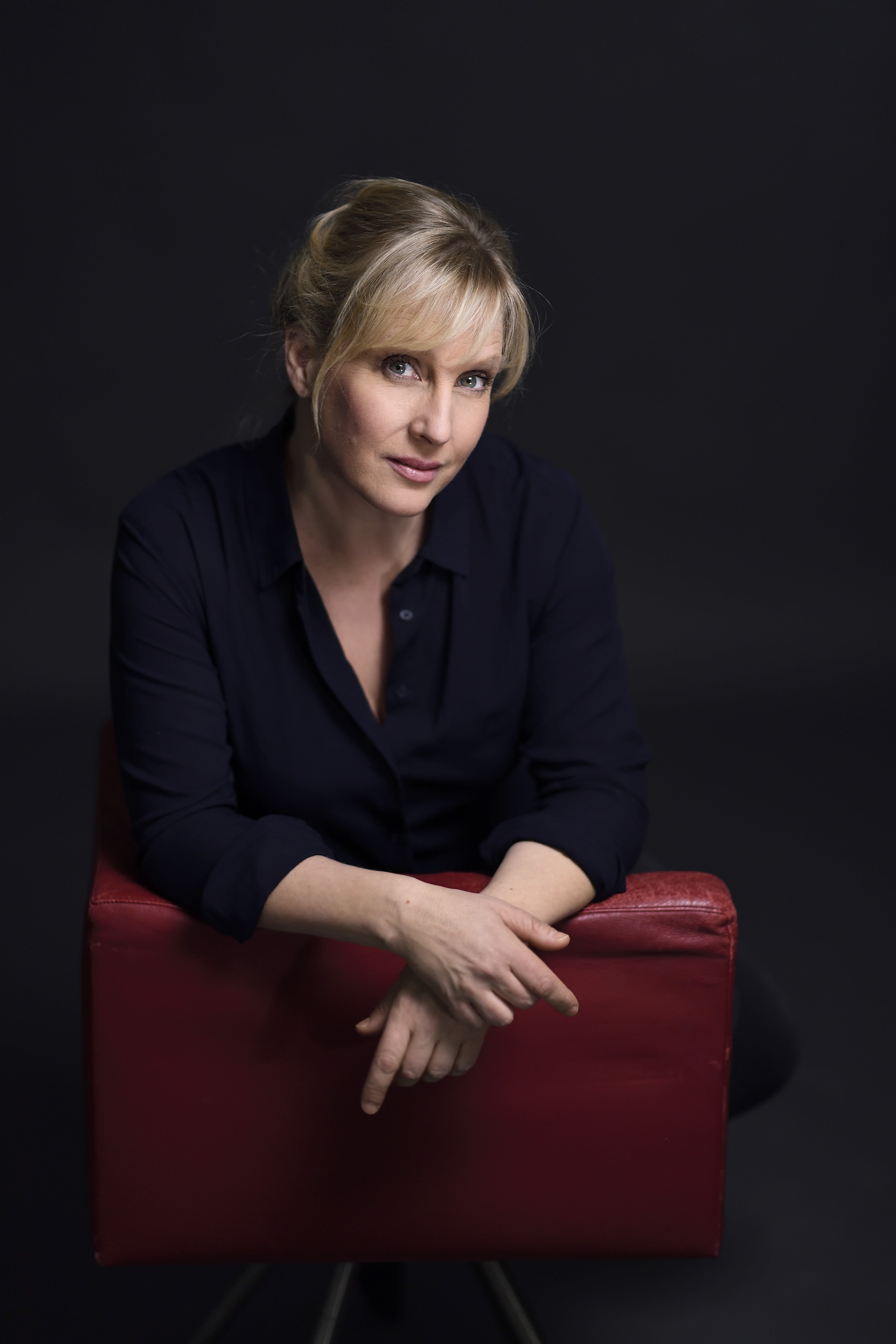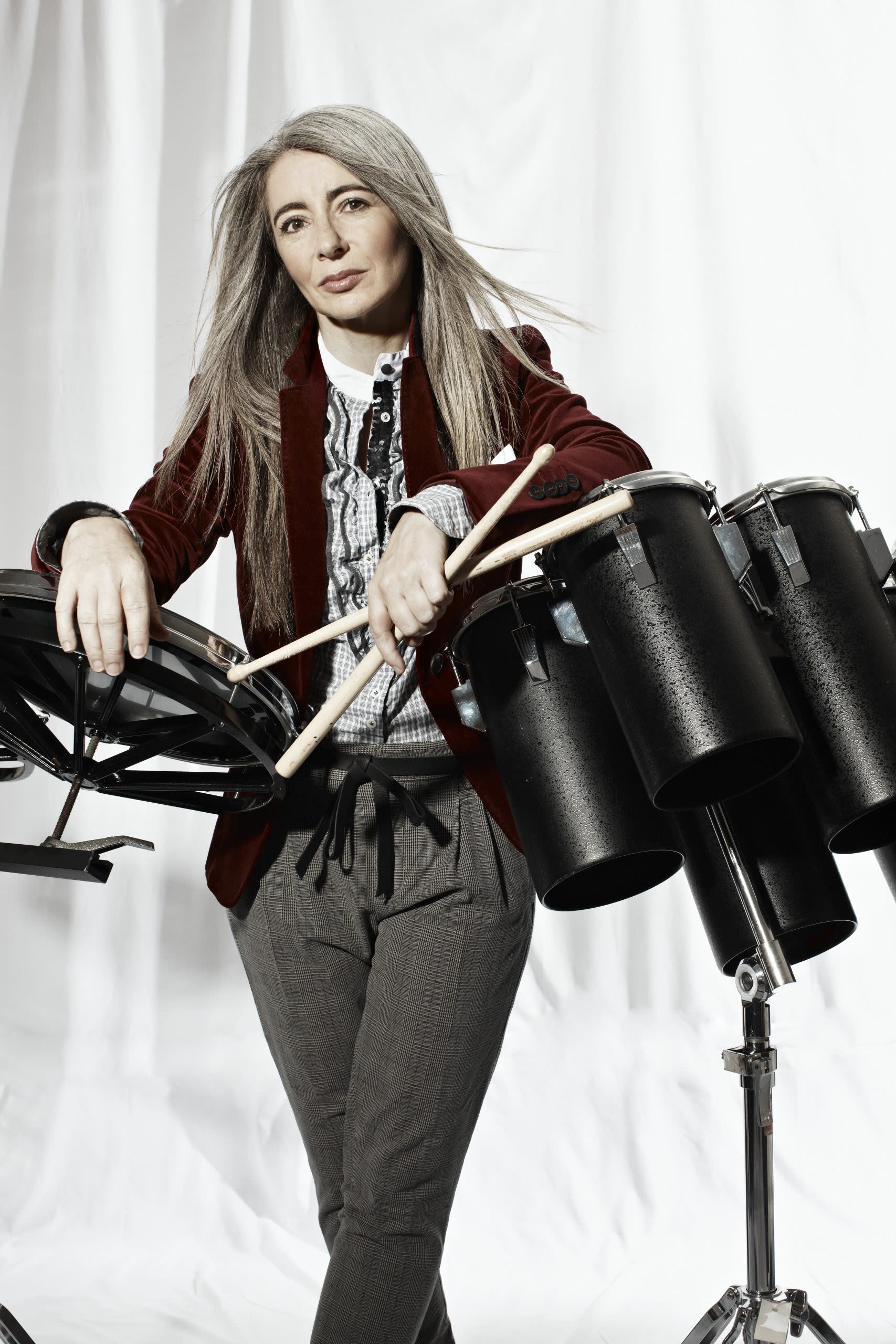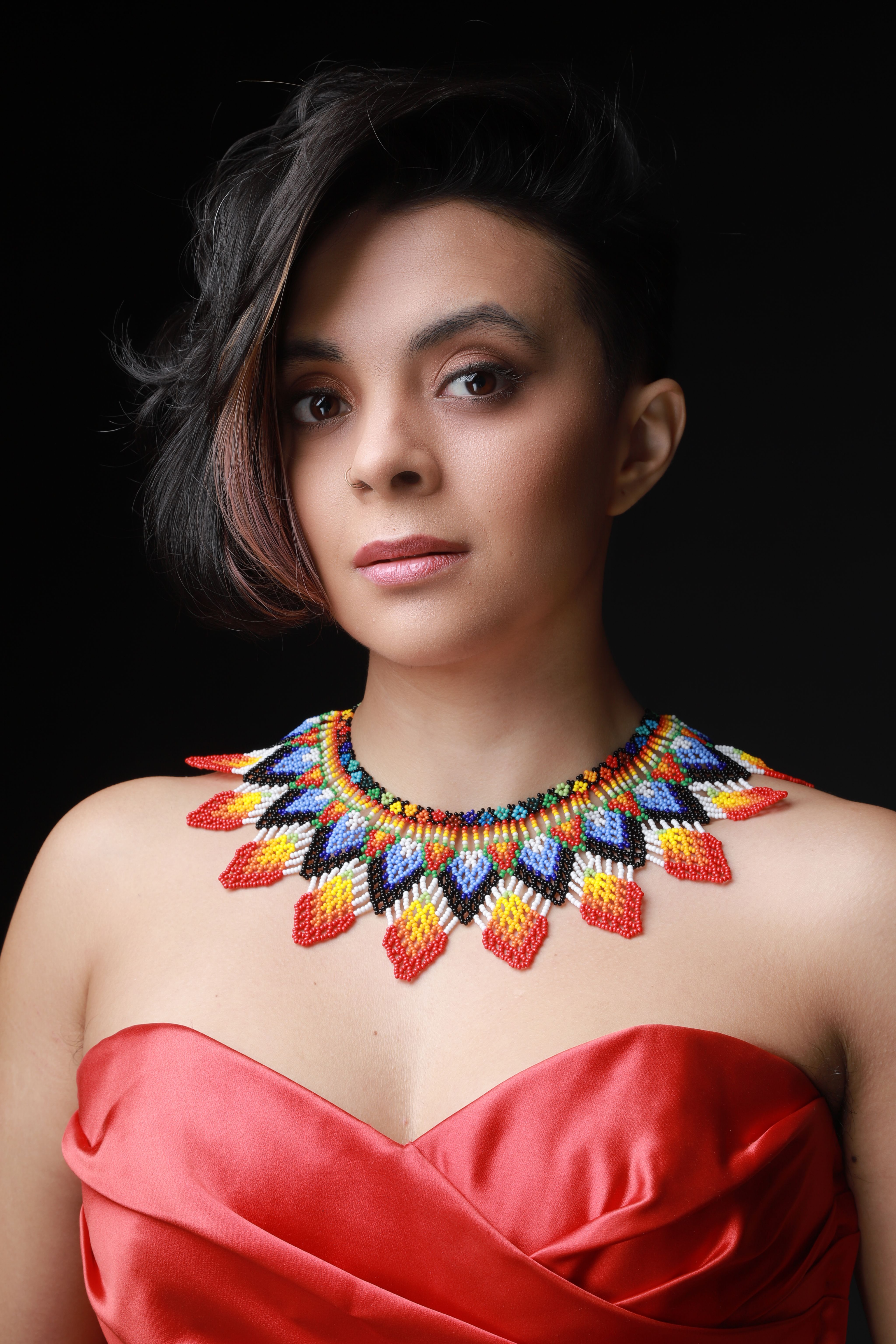

Stardust and Souls
Thursday 18/4/24, 7.30pm
BBC Hoddinott Hall, Cardiff

Dani Howard
Percussion Concerto world premiere c25’
INTERVAL: 20 minutes
Alexander Campkin
Sounds of Stardust world premiere c15’
Francis Poulenc
Stabat mater 31’
Sofi Jeannin conductor
Dame Evelyn Glennie percussion
Julieth Lozano Rolong soprano
BBC National Chorus of Wales

The concert is being broadcast live by BBC Radio 3 in Radio 3 in Concert; it will be available for 30 days after broadcast via BBC Sounds, where you can also find podcasts and music mixes. It is also being livestreamed via the BBC NOW website.
Introduction
Welcome to tonight’s concert, for which we’re delighted to welcome Sofi Jeannin – Chief Conductor of the BBC Singers – to conduct BBC National Orchestra and Chorus of Wales.
We have two world premieres on the programme, launching with Dani Howard’s dazzling new Percussion Concerto. Unveiling it tonight is Dame Evelyn Glennie, for whom it was written.
Sounds of Stardust is Alexander Campkin's response to looking at the night sky and marvelling at what he describes as the way it ‘acts as a metaphor for the celebration of differences, disability and love’. He sets his own reflective poems, which are sung by the Chorus and soprano Julieth Lozano Rolong, who made such an impression at last year’s BBC Cardiff Singer of the World.
We finish with Poulenc’s Stabat mater, a work setting the ancient text of Mary mourning at the foot of Christ’s Cross. The composer wrote it in response to the death of his friend, the artist Christian Bérard. In it, we find qualities of tenderness and grief interspersed with a secular beauty entirely typical of the composer.
Enjoy!
Matthew Wood
Head of Artistic Planning and Production
Please respect your fellow audience members and those listening at home. Turn off all mobile phones and electronic devices during the performance. Photography and recording are not permitted.
Dani Howard (born 1993)
Percussion Concerto (2023–4)
world premiere

1 Dot and Dash –
2 Menlo Park –
3 Eureka –
4 Unfinished Business
5 Light Bulb Moment
Dame Evelyn Glennie percussion
The inspiration behind this percussion concerto is the story of America’s most prolific inventor, Thomas Alva Edison. He was a self-taught man: born in 1847 he had only three months of formal schooling before going to work selling newspapers on a long-distance train at the age of 12. This led to an intense fascination with the telegraph system, which had changed the world by its ability to send lightning-fast messages through wires. He taught himself Morse code and practised it endlessly, finally getting a job as a telegrapher aged 15.
He worked as a telegrapher for seven years before heading to New York to become an inventor. By the age of 29 he had made enough money to realise his dream, building a laboratory called Menlo Park, where he and his team could invent full-time. This resulted in some of the key inventions that are still essential parts of our lives today.
In this concerto the soloist embodies the American inventor through five movements, each representing key moments of his life and career.
1 Dot and Dash
The first movement ‘Dot and Dash’ (as he nicknamed his two children), is centred around Morse code. Focused on accents heard on the marimba, these patterns lay the foundations for all the rhythmic material found in the concerto. As a 29-year-old, Edison was ambitious and full of ideas. He was obsessed with the idea of changing the world by coming up with new ways to achieve things – there is a naivety and a youthful excitement that underpin this opening movement.
2 Menlo Park
This was Edison’s dream laboratory in which he conducted all manner of experiments with different materials. This movement represents him in full explorative mode, and we can sense Edison’s excitement and child-like creativity through the many sounds conjured by the snare drum.
3 Eureka
This movement centres around Edison’s first notable invention: the phonograph. He set his mind to the task of capturing sound for the first time, which he did by using tinfoil inside the machine. This movement uses a variety of metal instruments, with the second half having the soloist in ‘deep focus’, exploring the different materials through an extended improvisation.
4 Unfinished Business
Edison’s huge success came at a price, with him finding himself travelling across the country, demonstrating his new phonograph. Frustration built as he realised he still had huge ambitions and a desire to create. These pressures alongside a busy schedule (a result of his new-found fame) put him in an unusual emotional state. We can hear this reflected in the larger instruments chosen for this movement, with a range of tom-toms, bass drum and an extended tam-tam improvisation to end it.
5 Light Bulb Moment
The invention of the light bulb was his crowning achievement and the key to his legacy. This movement uses the full palette of sounds heard in the rest of the concerto, symbolising the coming-together of his previous life experiences. There is maturity here, and a deep desire to accomplish this enormous challenge – changing the course of history itself.
Programme note © Michael Howard
INTERVAL: 20 minutes
Alexander Campkin (born 1984)
Sounds of Stardust (2023–4)
world premiere

1 Stardust streaking
2 Stardust settles
3 Stardust dancing
Julieth Lozano Rolong soprano
BBC National Chorus of Wales
The night sky is breath-taking. Despite knowing little about astronomy, I keep an eye out for meteor showers and occasional special events. I enjoy the spectacular beauty of the sky at night, which is both perfect and varied.
The theme of the night sky acts as a metaphor for the celebration of differences, disability and love.
Does one ever look at the night sky and imagine that it would be improved if the stars were all lined up, all with the exact same luminosity, and all shining in identical colours? Why is it that we sometimes seem to expect all people to conform, as if everybody had the same talents and abilities? Rather, why do we not so readily celebrate the beauty in difference?
Each of my three poems uses words such as ‘tingling’, ‘burning’, ‘searing’ and ‘scorching’ to reference the pins and needles and discomforting symptoms of multiple sclerosis that I've had for decades. Yet looking to the night sky provides me with a sense of comfort and freedom:
… I lose myself, and yet I find
shimmering strength and bliss
Many people may find it difficult to discuss such things within our society. My piece offers a lingering hope and yearning to engage with each other in kindness, openness and acceptance:
Spilling secrets in tender sight …
Programme note © Alexander Campkin
Text
1 Stardust streaking
Stardust streaking
Tingling fingers
Tracing meteors
Splashing hues of light.
Stardust shimmers in
Tingling eyes
Burning, blazing
Through the night.
A spell of tranquillity.
Stardust whispers
Glisten with wonders;
Fragile sparks
Spilling secrets in tender sight.
2 Stardust settles
Whispers radiant with dreams!
I lie and watch in pure delight
A guiding star through the dark,
In the vast expanse of night.
Shining in gold, captivating,
And the tingling glow of a celestial kiss,
On shooting souls stardust settles;
Then quietness crept through the sky.
And I lose myself, and yet I find
shimmering strength and bliss.
As cool grass cradles my body
I stretch out my arms on the ground.
And in that moment I feel not alone,
My thoughts floating through timeless cosmic sound.
Stardust settles
Ar Hyd y Nos.
3 Stardust dancing
With burning toes we dance with stars agaze,
With scorching hands we reach with love and awe.
With tingling fingers we point to meteors,
Crescendos shooting searing trails of fire.
The shimmering jewels sparking through the skies –
Celestial dancers leaping in our eyes!
The guiding star in radiance sings our dreams
And, shining true, is bathed in tender light.
Ar Hyd y Nos.
© Alexander Campkin
Francis Poulenc (1899–1963)
Stabat mater (1950–51)

1 Stabat mater dolorosa
2 Cujus animam gementem
3 O quam tristis
4 Quae moerebat
5 Quis est homo
6 Vidit suum
7 Eja, mater
8 Fac ut ardeat
9 Sancta mater
10 Fac ut portem
11 Inflammatus et accensus
12 Quando corpus
Julieth Lozano Rolong soprano
BBC National Chorus of Wales
The motivation behind Poulenc’s Stabat mater was the death in 1949 of his friend and collaborator, the painter Christian Bérard. The initial idea was to compose a Requiem but he soon dismissed this as too pretentious by half and settled instead on the tender 13th-century penitential poem Stabat mater dolorosa, which describes the suffering of the Virgin Mother at the foot of Christ’s Cross.
The music is vintage Poulenc, setting chordal and polyphonic austerity against pages of lushly erotic voluptuousness. This apparent dichotomy should come as no surprise: Poulenc readily accepted within himself the opposing tugs of sacred and secular. His religious works were frequently nourished by his affairs of the heart and in the late 1940s, just before starting the Stabat mater, he embarked on a relationship with a young man called Lucien Roubert. In 1955 Poulenc confessed in a letter to his close friend, the baritone Pierre Bernac, that Lucien was the ‘secret’ of the Stabat mater as well as the opera Dialogues des Carmélites – but by then the anguish of this love affair, having brought him to the verge of a nervous breakdown in 1954, had passed to an oddly serene acceptance that Roubert was dying of tuberculosis. It was as if, Poulenc said (quoting Georges Bernanos, the librettist of Carmélites), ‘we do not die for ourselves alone but for, or instead of, each other’.
On 26 March 1962, almost 10 months to the day before his own death, Poulenc wrote to Bernac: ‘I have finished Les ténèbres and think it is beautiful … With the Gloria and the Stabat I think I have three good religious works. May they spare me a few days of Purgatory, if I do narrowly avoid going to Hell.’ His prayer was surely answered.
Programme note by Geraint Lewis © BBC
Text
1
Stabat mater dolorosa
Juxta crucem lacrimosa,
Dum pendebat Filius.
2
Cujus animam gementem,
Contristantem, ac dolentem
Pertransivit gladius.
3
O quam tristis et afflicta
Fuit illa benedicta
Mater Unigeniti!
4
Quae moerebat et dolebat
Pia Mater, cum videbat
Nati poenas inclyti.
5
Quis est homo qui non fleret,
Matrem Christi si videret
In tanto supplicio?
Quis non posset contristari,
Matrem Christi contemplari,
Dolentem cum Filio?
Pro peccatis suae gentis
Vidit Jesum in tormentis
Et flagellis subditum.
6
Vidit suum dulcem natum
Morientem desolatum,
Dum emisit spiritum.
7
Eja, mater, fons amoris,
Me sentire vim doloris
Fac, ut tecum lugeam.
8
Fac ut ardeat cor meum
In amando Christum Deum,
Ut sibi complaceam.
9
Sancta mater, istud agas
Crucifixi fige plagas
Cordi meo valide.
Tui nati vulnerati,
Tam dignati pro me pati,
Poenas mecum divide.
Fac me vere tecum flere,
Crucifixo condolere
Donec ego vixero.
Juxta crucem tecum stare,
Te libenter sociare
In planctu desidero.
Virgo virginum praeclara,
Mihi jam non sis amara,
Fac me tecum plangere.
10
Fac ut portem Christi mortem,
Passionis fac consortem
Et plagas recolere.
Fac me plagis vulnerari,
Cruce hac inebriari
Ob amorem FiIii.
11
Inflammatus et accensus
Per te, Virgo, sim defensus
In die judicii.
Christe, cum sit hunc exire,
Da per Matrem me venire
Ad palmam victoriae.
12
Quando corpus morietur,
Fac ut animae donetur
Paradisi gloria.
Amen.
Translation
At the Cross her station keeping
stood the mournful mother weeping,
close to Jesus to the last.
Through her heart, his sorrow sharing,
all his bitter anguish bearing,
now at length the sword has passed.
Oh, how sad and sore distressed
was the mother, highly blest,
of the sole-begotten one!
Christ above in torment hangs;
she beneath beholds the pangs
of her dying glorious son.
Is there one who would not weep,
whelmed in miseries so deep
Christ’s dear mother to behold?
Can the human heart refrain
from partaking in her pain,
in that mother’s pain untold?
For the sins of his own nation
she saw him hang in desolation,
all with bloody scourges rent.
She beheld her gentle child
dying, forsaken and defiled,
as his spirit passed away.
O thou mother, fount of love,
touch my spirit from above,
make my heart with thine accord.
Make me feel as thou hast felt;
make my soul to glow and melt
with the love of Christ our Lord.
Holy mother, pierce me through;
in my heart each wound renew
of my saviour crucified.
Let me share with thee his pain,
who for all my sins was slain,
who for me in torments died.
Let me mingle tears with thee,
mourning him who mourned for me,
all the days that I may live.
By the cross with thee to stay.
there with thee to weep and pray,
is all I ask of thee to give.
Virgin of all virgins best,
listen to my fond request:
let me share thy grief divine.
Let me to my latest breath
in my body bear the death
of that dying son of thine.
Wounded with his every wound,
steep my soul till it hath swooned
in his very blood away.
Be to me, O Virgin, nigh
lest in flames I burn and die
in his awful judgement day.
Christ, when thou shalt call me hence,
be thy mother my defence,
be thy cross my victory.
While my body here decays,
may my soul thy goodness praise,
safe in Paradise with thee.
Amen.
Help Us Improve Our Online Programmes.
Please take this 5-minute survey and let us know what you think of these notes.
Programme Survey
You may also like:
Bartók’s Concerto for Orchestra
Thursday 9/5/24, 7.30pm
BBC Hoddinott Hall, Cardiff
Friday 10/5/24, 7.30pm
Brangwyn Hall, Swansea
Caroline Shaw The Observatory UK premiere
Ravel Piano Concerto in G major
Bartók Concerto for Orchestra
Giancarlo Guerrero conductor
Sergio Tiempo piano
COLOURFUL | DYNAMIC | ENTHRALLING
Caroline Shaw’s The Observatory (which receives its UK premiere) was inspired by a trip to the Griffin Observatory near the Hollywood Bowl; it explores in sound new ways of looking at the universe, melding old and new with chaos and clarity, in a tantalising stream of consciousness.
Ravel’s atmospheric Piano Concerto, a rich mix of lyricism, evocative orchestration and virtuoso piano writing, is performed by the inimitable Sergio Tiempo as he makes his debut with BBC NOW. The virtuosity continues in Bartók’s brilliant, folk-inflected Concerto for Orchestra, which closes this breathtaking programme, conducted by the illustrious Grammy Award-winning Costa Rican conductor Giancarlo Guerrero.
A Little Night Music
Thursday 16/5/24, 7.30pm
BBC Hoddinott Hall, Cardiff
Fauré Pelléas et Mélisande – suite
Stephen McNeff The Celestial Stranger world premiere
Schoenberg Verklärte Nacht (1943 version)
Joana Carneiro conductor
Gavan Ring tenor
REVOLUTIONARY | PROFOUND | ILLUMINATING
Celestial, sparking lights glitter in this evening of ground-breaking music. Fauré’s suite from Pelléas et Mélisande opens in resplendent yet tumultuous style – the first musical setting of Maurice Maeterlinck’s play of the same name, which would inspire other composing greats, including Debussy, Sibelius and Schoenberg.
We move to more ethereal heights with the world premiere of Stephen McNeff’s The Celestial Stranger; then, 150 years since the birth of Schoenberg, we celebrate this radical composer with a performance of Verklärte Nacht (Transfigured Night), an early work that first made the name of a man who would change the course of musical history when he created dodecaphonic music, more commonly known as serialism. To conduct BBC NOW for the first time we welcome the wonderful Portuguese conductor Joana Carneiro.
Gergely Madaras conducts …
Friday 21/06/24, 7.30pm
BBC Hoddinott Hall, Cardiff
Debussy Prélude à l’après-midi d’un faune
Debussy Nocturnes
Christian Mason Thaleia UK premiere
Franck Psyché – ‘Les jardins d’Éros’
Gergely Madaras conductor
Noémi Győri flute
BBC National Chorus of Wales
BEGUILING | ILLUSTRATIVE | ENTRANCING
Shimmering ambiguity and transparent harmonies glisten with subtly Eastern-inspired melodies, nuance and sheer beauty in Debussy’s ground-breaking Prélude à l’après-midi d’un faune, depicting the dreams and encounters of a mythical faun. We then explore light and shade in his Nocturnes, inspired by Whistler’s series of paintings of the same name. In the first, ‘Nuages’, we experience airily luminous melody, followed by propulsive rhythmic drive in ‘Fêtes’, while the use of women’s voices in ‘Sirènes’ brings an eerie quality to the texture.
Christian Mason’s flute concerto Thaleia uses the solo instrument in a mellifluously uninhibited style, reflective of Debussy’s L’après-midi. It was written for Noémi Győri as part of her ‘Contemplation of the Nymph’ project, with the characteristics of Thaleia, a Naiad-nymph of Mount Etna, taking the focal role. We’re delighted that Noémi will join BBC National Orchestra of Wales and conductor Gergely Madaras for the work’s UK premiere. We end this enchanting concert with ‘Les jardins d’Éros’ from Franck’s symphonic poem Psyché, setting words by Sicard and Louis de Fourcaud and inspired by Apuleius’s Metamorphoses.
Biographies
Sofi Jeannin conductor

Photo: Radio France/Christophe Abramowitz
Photo: Radio France/Christophe Abramowitz
Swedish-born Sofi Jeannin has established herself as one of the finest choral specialists around today. She is currently Chief Conductor of the BBC Singers (winner of the 2024 RPS Ensemble Award), Music Director of La Maîtrise de Radio France and Chief Conductor of ARS NOVA Copenhagen. She was previously Music Director of the Choeur de Radio France (2015–18).
She also has a busy and fulfilling guest conducting career. This season she conducts Handel’s Messiah with Britten Sinfonia, Bach’s St Matthew Passion with the Dunedin Consort, Handel’s Coronation Anthems and new works by Anna Clyne, Héloïse Werner, Ben Nabuto and Roderick Williams. This month she participates in the choral music festival Tokyo Cantata; she also works with the Netherlands Radio Philharmonic Orchestra and Choir on Unsuk Chin’s Alice in Wonderland.
Other recent highlights include appearances with the Hallé, New Japan and Royal Liverpool Philharmonic orchestras, Norrköping, Seattle and Singapore Symphony orchestras and Auckland Philharmonia, conducting repertoire such as Haydn’s The Seasons, Poulenc’s Gloria, Stravinsky’s Symphony of Psalms, Britten’s Sinfonia da Requiem, Fauré’s Requiem and Bach’s Christmas Oratorio and St Matthew Passion. Notable choral projects include appearances with Swedish Radio Chorus, Coro Casa da Música, DR VokalEnsemblet, Chamber Choir Ireland and NFM Choir Wrocław.
She is committed to education and outreach work and has worked with the Chorus and Orchestra of Kinshasa, Congo, and has also been involved in El Sistema, Greece, since 2017. She regularly gives workshops and masterclasses around the world.
She studied conducting and singing at the Stockholm Royal College of Music, Nice Conservatoire and subsequently at London’s Royal College of Music with Paul Spicer. She conducted her first BBC Radio 3 broadcast, the UK premiere of Consolation I by Helmut Lachenmann, in 2006.
Sofi Jeannin was given the title Chevalier de l’ordre national du Mérite by the French Ministry of Culture in 2021 and was awarded the Grand Prix Antoine Livio from the Presse Musicale Internationale in 2024.
Dame Evelyn Glennie percussion

Dame Evelyn Glennie is the first person to have created and sustained a full-time career as a solo percussionist, performing worldwide with the greatest orchestras and artists. She paved the way for orchestras to feature percussion concertos when she played Sir James MacMillan’s Veni, veni, Emmanuel, the first percussion concerto in the history of the Proms, at the Royal Albert Hall in 1992.
She has commissioned over 200 works from many of the world’s most eminent composers. She also composes music for film, television, theatre and music library companies. She has won two Grammy awards and is a BAFTA nominee. She regularly provides masterclasses and consultations to inspire the next generation of musicians.
She had a prominent role in the Opening Ceremony of the London 2012 Olympic Games, in which she led 1,000 drummers and which featured a new instrument, the Glennie Concert Aluphone.
She has released over 40 albums, ranging from original improvisations to percussion concertos and ground-breaking modern solo percussion projects.
She was awarded an OBE in 1993 and has over 100 international awards to date, including the Polar Music Prize, the Léonie Sonning Music Prize and the Companion of Honour. She was appointed as the first female President of Help Musicians, only the third person to hold the title since Edward Elgar and Peter Maxwell Davies. Since 2021 she has been Chancellor of Robert Gordon University, Aberdeen.
She launched the Evelyn Glennie Podcast in 2020, featuring popular personalities from the world of music, sport, television and academia. She curates The Evelyn Glennie Collection, which includes more than 3,800 percussion instruments. Last year she set up the Evelyn Glennie Foundation, which aims to improve communication and social cohesion by encouraging everyone to discover new ways of listening in order to inspire, create, engage and empower.
Julieth Lozano Rolong soprano

Photo: Bernado Borghetti
Photo: Bernado Borghetti
Award-winning Colombian soprano Julieth Lozano Rolong won the Dame Kiri Te Kanawa Audience Prize at last year’s BBC Cardiff Singer of the World competition, as well as being named one of Opera Wire’s Top Ten Rising Stars of 2023.
This season she returned to Welsh National Opera to reprise the role of Nuria (Osvaldo Golijov’s Ainadamar). She made her debut with the company at the delayed Dubai Expo 2020 in the new production of Al Wasl Opera as Zayed/Young Mary conducted by Justin Brown. This season she also makes debuts with English National Opera and Glyndebourne Festival.
She began last season in Colombia as Susanna (The Marriage of Figaro) at Teatro Mayor under the baton of Martin Haselböck. She then made her debut with Scottish Opera as Nuria under the baton of Stuart Stratford, before spending the rest of the season at the Grand Théâtre Genève as part of their Jeune ensemble. Here, her roles included a Flowermaiden (Parsifal), Melanto (Il ritorno d’Ulisse in patria), the Doctor (Christian Jost’s Voyage vers l’espoir) and Aksinya (The Lady Macbeth of the Mtsensk District).
Previous engagements include the title-role in The Cunning Little Vixen for Longborough Festival Opera, Zerlina (Don Giovanni) at the Verbier Festival, Tytania (A Midsummer Night’s Dream) for Opera al Parque, Colombia, Despina (Così fan tutte) at the Cartagena International Music Festival, Susanna (The Marriage of Figaro) at the Royal College of Music and Norina (Don Pasquale) for Random Opera.
A 2020 Kathleen Ferrier competition finalist, and a recipient of the 2018 President's award, she appeared in the BBC documentary Queen Victoria: My Musical Britain recorded in 2019. She has performed at the Royal Albert Hall, V&A Museum and many other venues worldwide.
Julieth Lozano Rolong graduated with a Masters in Vocal Performance and an Artist Diploma in Opera from the Royal College of Music, where she studied with Dinah Harris. An Irene Hanson and Independent Opera at Sadler’s Wells scholar, she was also a 2019/20 Young Artist at the National Opera Studio in London.
BBC National Orchestra of Wales
For over 90 years, BBC National Orchestra of Wales has played an integral part in the cultural landscape of Wales, occupying a distinctive role as both broadcast and national symphony orchestra. Part of BBC Wales and supported by the Arts Council of Wales, it has a busy schedule of live concerts throughout Wales, the rest of the UK and the world.
The orchestra is an ambassador of Welsh music and champions contemporary composers and musicians; its concerts can be heard regularly across the BBC – on Radio 3, Radio Wales and Radio Cymru.
BBC NOW works closely with schools and music organisations throughout Wales and regularly undertakes workshops, side-by-side performances and young composer initiatives to inspire and encourage the next generation of performers, composers and arts leaders.
The orchestra is based at BBC Hoddinott Hall in Cardiff Bay, where its purpose-built studio not only provides the perfect concert space, but also acts as a broadcast centre from where its live-streamed concerts and pre-recorded content are presented as part of its popular Digital Concert Series.
For further information please visit the BBC National Orchestra and Chorus of Wales’s website: bbc.co.uk/now
Patron
HM King Charles III KG KT PC GCB
Principal Conductor
Ryan Bancroft
Conductor Laureate
Tadaaki Otaka CBE
Composer-in-Association
Gavin Higgins
Composer Affiliate
Sarah Lianne Lewis
First Violins
Lesley Hatfield leader
Nick Whiting associate leader
Gwenllian Hâf MacDonald
Terry Porteus
Suzanne Casey
Anna Cleworth
Emilie Godden
Marie-Noelle Richard =
Juan Gonzalez
Žanete Uškāne
Ruth Heney
Carmel Barber
Rebecca Totterdell
Gary George-Veale
Second Violins
Anna Smith *
Ros Butler
Sheila Smith
Lydia Caines
Katherine Miller
Beverley Wescott
Roussanka Karatchivieva
Pierre Coulaud =
Ilze Abola
Joseph Williams
Michael Topping
Vickie Ringguth
Violas
Alex Thorndike #
Tetsuumi Nagata
Peter Taylor
Anna Growns
Catherine Palmer
Lydia Abell
Robert Gibbons
Daire Roberts
Lucy Theo
Anne Marie Lemeunier =
Cellos
Tim Hugh ‡
Raphael Lang
Sandy Bartai
Alistair Howes
Rachel Ford
Keith Hewitt
Carolyn Hewitt
Kathryn Graham
Double Basses
David Stark *
Alexander Jones #
Manuel Jouen =
Christopher Wescott
Richard Gibbons
Ruohua Li
Flutes
Matthew Featherstone *
John Hall †
Lindsey Ellis
Piccolo
Lindsey Ellis †
Oboes
Catriona MacKinnon ‡
Amy McKean †
Sam Baxter
Cor anglais
Sam Baxter
Clarinets
Anna Hashimoto ‡
Ivan Rogachev
Lenny Sayers
Bass Clarinet
Lenny Sayers †
Bassoons
Jarosław Augustiniak *
Izabela Musial
David Buckland
Contrabassoon
David Buckland †
Horns
Neil Shewan †
Tom Taffinder
John Davy
Craig MacDonald
Lynn Henderson
Trumpets
Philippe Schartz *
Robert Samuel
Corey Morris †
Trombones
Donal Bannister*
Jake Durham
Bass Trombone
Darren Smith †
Tuba
Anders Swane
Timpani
Steve Barnard *
Percussion
Phil Girling
Phil Hughes
Rhydian Griffiths
Harps
Eluned Pierce
Nia Evans
Piano/Celesta
Catherine Roe Williams
* Section Principal
† Principal
‡ Guest Principal
# Assistant String Principal
= Orchestre National de Bretagne
The list of players was correct at the time of publication
Director Lisa Tregale
Orchestra Manager appointment in progress
Assistant Orchestra Manager Nick Olsen
Orchestra Personnel Manager Kevin Myers
Business Coordinator Caryl Evans
Orchestra Administrator Eleanor Hall +
Head of Artistic Planning and Production Matthew Wood
Artists and Projects Manager Victoria Massocchi **
Orchestra Librarian Eugene Monteith
Producer Mike Sims
Broadcast Assistant Kate Marsden
Head of Marketing and Audiences Sassy Hicks
Marketing Coordinator Amy Campbell-Nichols +
Digital Producer Yusef Bastawy
Social Media Coordinator Harriet Baugh
Education Producers Beatrice Carey, Rhonwen Jones **
Audio Supervisors Simon Smith, Andrew Smillie
Production Business Manager Lisa Blofeld
Stage and Technical Manager Steven Brown +
Assistant Stage and Technical Manager Josh Mead
BBC Wales Apprentice Jordan Woodley
+ Green Team member
** Diversity & Inclusion Forum
BBC National Chorus of Wales
BBC National Chorus of Wales is one of the leading mixed choruses in the UK and, while preserving its amateur status, works to the highest professional standards under Artistic Director Adrian Partington.
Based at BBC Hoddinott Hall in Cardiff Bay, the chorus, which celebrates its 40th birthday this season, regularly works alongside BBC National Orchestra of Wales, as well as giving concerts in its own right. Made up of over 120 singers, the chorus comprises a mix of amateur choristers alongside students from both the Royal Welsh College of Music & Drama and Cardiff University.
Recent highlights include performances of Fauré’s Requiem and Messiaen’s rarely performed O sacrum convivium with Ludovic Morlot, Haydn’s ‘Nelson’ Mass with renowned early-music specialist Christian Curnyn and a CD of Sir Karl Jenkins’s Dewi Sant in his 80th birthday year, plus annual engagements at the BBC Proms – with recent appearances including John Adams’s Harmonium with Principal Conductor Ryan Bancroft, Vaughan Williams’s A Sea Symphony with Andrew Manze and Mozart’s Requiem from memory with Nathalie Stutzmann.
The 2023–24 season sees the chorus perform Vaughan Williams’s Five Mystical Songs with Harry Bicket, Karl Jenkins’s Dewi Sant to mark St David’s Day, Poulenc’s Stabat mater and the world premiere of Alexander Campkin’s Sounds of Stardust alongside BBC Cardiff Singer of the World Audience Prize-winner Julieth Lozano Rolong, plus the basses perform Shostakovich’s gritty 13th Symphony under the baton of Ryan Bancroft.
Committed to promoting Welsh and contemporary music, BBC National Chorus of Wales gave the second-ever performance of Grace Williams’s Missa Cambrensis, 45 years after its premiere, which it has just recorded for CD release later this year, and has premiered works by many composers, including a special performance of Kate Whitley’s Speak Out, set to the words of Malala Yousafzai’s 2013 UN Speech.
The Chorus can be heard on BBC Radio 3, BBC Radio Wales and BBC Radio Cymru, and recently featured in Paul Mealor’s soundtrack for BBC Wales’s Wonders of the Celtic Deep.
BBC National Chorus of Wales
Artistic Director Adrian Partington
Accompanist Chris Williams
Soprano 1
Elizabeth Aitken
Jessica Rose Baber
Ella Edwards Beavington
Eve Bennett
Beth Bradfield
Logan Clark
Bethan M. Evans
Sally Glanfield
Sarah Jane Griffiths
Darcie Hamilton
Claire Hardy
Caitlin Hockley
Vanessa John-Hall
Rebecca Jolliffe
Lucie Jones
Joanna Leighton
Katherine Meredith
Joanna Osborn
Elizabeth Phillips
Charlotte Town
Helen Thomas
Jo Westaway
Soprano 2
Kate Bidwell
Dee Cooke
Isabel D’Avanzo
Rhianwen Hallows
Emily Hopkins
Rhiannon Humphreys
Victoria Illsley
Pippa Johnson
Julie Jones
Margaret Lake
Amélie Mack
Melanie Taylor
Caroline Thomas
Hannah Williams
Katherine Woolley
Alto 1
Ceri-Ann Absalom
Catherine Bradfield
Anna Beresford
Atiyeh Dast Afkan
Catherine Duffy
Rachel Farebrother
Kathrin Hammer
Naomi Anne Hitchings
Lisa May
Shanta Miller
Kate Reynolds
Zozi Sookanadenchetty
Vicki Westwell
Jessica Williams
Alto 2
Yasmin Browne
Alex Butler
Annette Hecht
Yvonne Higginbottom
Max Keith
Eleanor Prescott
Sian Schutz
Julie Wilcox
Thomas Wilde
Tenor 1
Oli Bourne
Roland George
Phil Holtam
Huw Llywellyn
Andrew Morris
Orlando Vas
Nick Willmott
Tenor 2
Rhys Archer
Mike Ennis
Peter Holmes
Owen Parsons
Richard Shearman
Deryck Webb
Richard Wilcox
Bass 1
Peter Cooke
Ethan Davies
Billy Donaghy
Rafael Grigoletto
Stephen Hamnett
David Hopkins
Jack Irwin
Emyr Wynne Jones
John Rhys Liddington
Lucas Maunder
Jez Piper
Neil Schofield
David Stephens
Alun Williams
Bass 2
Jeff Davies
Oliver Hodgson
Stuart Hogg
David McLain
Joseff Morris
Gareth Nixon
Mike Osborn
Nick Perfect
David Rodgers
The list of singers was correct at the time of publication
